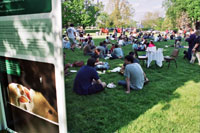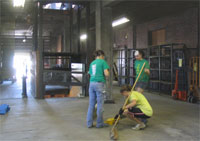| Kenyon’s efforts to educate about food do not stop at the classroom door. Working with the College’s dining service, AVI Foodsystems, Food for Thought has begun to turn the cafeteria into a classroom with materials about food and local rural life. Signs at food stations highlight local ingredients in menu selections.Tabletop displays, many created by students in conjunction with their coursework, explore the history of agriculture in Knox County, offer biographies of local food |

Kenyon students enjoy a picnic featuring local foods, one of many activities designed to explore the local food system.
|
producers, and examine the nutritional value of the foods we eat. Plans are underway for a series of student-produced films on local agriculture, to be shown in the dining hall on a large-screen monitor.
Kenyon’s new dining facility, set to open in 2008, is designed to facilitate a food-waste composting system. By reducing food waste, student board dollars can be better spent on high-quality local foods, and students will appreciate the social and environmental implications of their food habits. Toward this end, students in a campus environmental group sorted and weighed all food waste at two dining facilities for a three-day period. Their research suggests that students currently throw away approximately 450 pounds of food each day. To raise campus awareness of the issue, students have mounted displays of wasted food, placed trash bags representing food waste in the center of campus, and organized presentations as part of a campus “Sustainability Week.”
Student engagement with environmental issues has stimulated much campus activity regarding local food. In response to this interest, in 2006 students created a new campus organization, People Endorsing Agrarian Sustainability. PEAS emerged to promote the use of local foods in the campus dining halls, to educate the community about food- related issues, and to organize the efforts of various environmental groups already on campus. As a first initiative, PEAS members will take primary responsibility for developing educational materials to promote food-waste composting.
| Efforts to educate students into the local community now take place as part of Kenyon’s orientation for incoming students. In 2005, a group of three dozen first-year students was invited to Kenyon for a special preorientation program that featured engagement with the surrounding community. Rural Life Center director Howard Sacks provided a brief introduction to Food for Thought, after which the students spent much of the day cleaning out the Buckeye Candy & Tobacco Company building, which will become a retail outlet for local foods in Mount Vernon. |

Incoming Kenyon students prepare a warehouse for renovation as a local food outlet, as part of their first-year orientation program.
|
Following a local foods lunch, students toured a nearby organic farm.
Beginning in 2007, Food for Thought faculty organized a Sophomore Experience for twenty returning Kenyon students. The yearlong experience includes reading discussions, trips to local farms, panels with community members involved in the food system, and local food meals prepared together. The effort is designed to provide new opportunities for student-faculty interaction, offer insights into the food system, and educate Kenyon students and faculty into the surrounding rural community.
In all of these ways, Food for Thought works to mainstream efforts to understand food and our community throughout the College.
|
